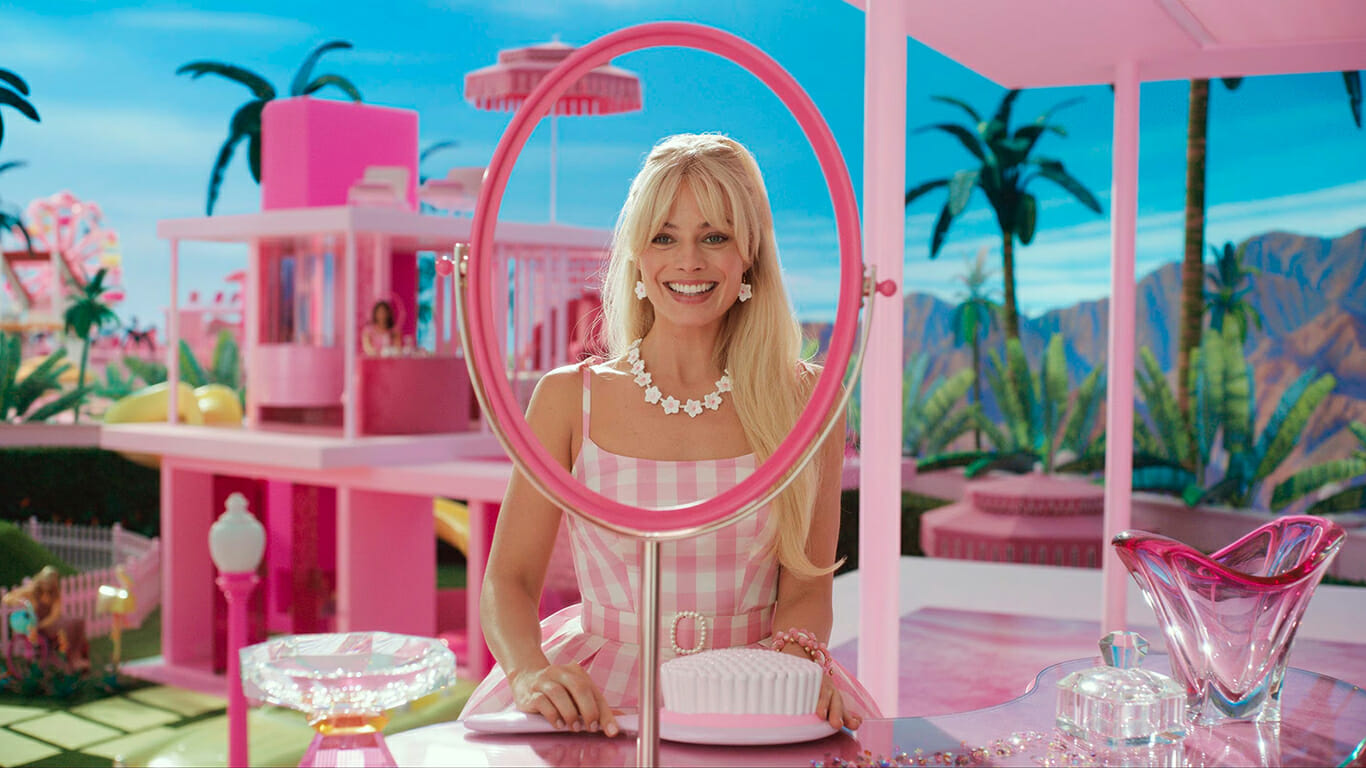In case you haven’t heard, the writers’ and actors’ guilds of America are currently on strike together for the first time since 1960 because film studios are treating them like—and paying them—dirt. Not everyone is an overpaid Marvel stooge; there are thousands of working actors and writers getting screwed by low pay, health insurance barriers, poor residuals from streaming services, and the looming threat of artificial intelligence (beyond the nightmare of AI-written scripts, studios have “offered” extras one day’s pay to have their likeness scanned for unlimited, uncompensated use). An anonymous studio exec said their goal is to let the strike “drag on until union members start losing their apartments and losing their houses.” Warner Bros. CEO David Zaslav, who made $246 million in 2021, had the nerve to denounce the strikes while scrubbing criticism of him from the internet. It’s a fight for artists’ lives out there. With all that said, let’s talk about Barbie, Warner Bros.’ first collaboration with multibillion-dollar toy company Mattel.
LEARN MORE: Mattel Adventure Park coming to Glendale in 2023
READ ALSO: Read all of Ryan Bordow’s movie reviews here
Fortunately, writers Greta Gerwig and Noah Baumbach know there are issues at play, and they’ve baked them into the film like two smart, socially conscious people (with corporations over their shoulders) would. To more directly address the elephants in the room, the team abolishes the fourth wall: the film opens with a parody of 2001: A Space Odyssey narrated by none other than Helen Mirren, the first of several winks to the audience that rely on our knowledge of the real world. Further thinning the veil, Mirren explains that the Barbies—who exist simultaneously as women in “Barbieland” and toys in reality—live blissfully knowing that their empowering product has solved all women’s problems in our world. You can almost hear Mirren winking as she says it.
Once the meta setup’s over, Barbie dives right into camp. The design of Barbieland is a feat of extravagance: life-size playsets with every detail intact from décor to plastic creases, a baby blue hand-painted sky stretching over giddy, hyperreal paradise, and so, so, so much pink. Between all the bright minutiae and the rules set for the world—little is “real,” not even the water, so the ocean is just motionless plastic—Barbieland rings with utter vision. Most visionary, maybe, was casting Ryan Gosling as Ken: from his very first frame, his every word and movement is sheer comic gold. There’s something about his eyes—completely self-aware yet cheerfully mindless, like he engineered his performance to feel in on the joke, rehearsed until that was second nature, and then erased his memory of being an actor. He fits the satire of Barbie like a (pink, sequined) glove.
So does Margot Robbie, here playing “Stereotypical Barbie.” When she starts suffering some strangely human symptoms—thoughts of death, subjection to gravity, and feet that aren’t perpetually arced for heels—she learns she must go to the real world, where whoever owns her is projecting human insecurities onto her. Ken comes along, naturally—he’s obsessed with Margot Barbie—and the two land in Los Angeles for fish-out-of-water shenanigans. While Barbie settles into reality, Ken’s shocked to find that, unlike Barbieland, the real world is run by men, and he grows drunk on the power of the patriarchy. It’s funny to the point of euphoria: the film’s script and visual wit are as sharp as they are silly, resulting in campy madcap mania akin to the criminally underseen Barb and Star Go to Vista Del Mar (Annie Mumulo, Barb herself, even appears).
In an early real-world scene, Barbie and Ken, fresh from Barbieland, arrive at Venice Beach, dressed in garish yellows and pinks and gliding by on roller skates. They get a hint that the real world’s not all they thought it was when bystanders start mocking them, but the bullying doesn’t feel genuine: if reality is anything to go by, two gaudy matching skaters should fit in at Venice Beach. The discrepancy is insignificant—the film is just hardening reality to get a point across—but cracks start to show when it softens reality to do the same.
Barbie eventually winds up at the offices of Mattel, where, in another of the film’s visual allusions, the cubicles echo those of Jacques Tati’s Playtime (think cold, isolated workspaces). Mattel’s top brass are worried that Barbie will break reality, so they invite her in a bid to send her back to Barbieland. It’s here that Barbie starts to gently rib Mattel: the CEO is a greedy, well-meaning idiot; the company claims to love women but doesn’t hire enough of them. Once again, the film winks through the fourth wall at its own weird context: “Yes, Mattel is in this for the money, but they let us call them out for it, so it’s fun!” Yet the ribbing is too palpably Mattel-sanctioned. Their chosen self-criticisms are no longer applicable—according to their website, women make up over half their workforce, and they achieved 100% pay equity in 2021. That’s great (if it’s true), but it makes the autocritique toothless.
With the fourth wall broken, we can’t be expected to leave reality’s baggage behind—especially with the strikes going on. Here in the real world that Barbie pokes and prods, the mind digresses to wonder: does Mattel give their workers decent benefits? Enough time off? A stake in the business? Barbie throws shade at capitalism, but only enough to get credit. And Mattel may have a handle on gender disparity, but does Warner Bros.? (The answer is “absolutely not.”) Curious they don’t appear in Barbie’s real world. There’s nothing inherently wrong with critiquing systems from within those systems—movies have been doing so since the birth of the medium—but Barbie feels just shy of boldly upsetting its benefactors, and teetering there just isn’t as fun as taking the plunge. That the film’s flagship speeches amount to Feminism 101 discussion posts (which, in a vacuum, would be fine) doesn’t help its perceived political timidity.
I say “perceived” because there’s a chance Barbie’s operating on an even higher level. It’s an innately compromised project: a more radical Barbie would never be made by Mattel and WB, but no one could make this Barbie in the first place without Mattel and a big studio. And given the film’s smart, smirking, self-aware tone, there’s a chance it knows that of itself: that it deliberately delivers a compromised vision to arraign the schemes behind the scenes. At the film’s satirical heights, it seems like that could be possible. But then the cracks show again—the lucrative but average soundtrack, some tacked-on emotional beats—and it feels like compromise for product’s sake. Who knows? At least it’s rarely not funny.
★★★½ (3.5/5)




